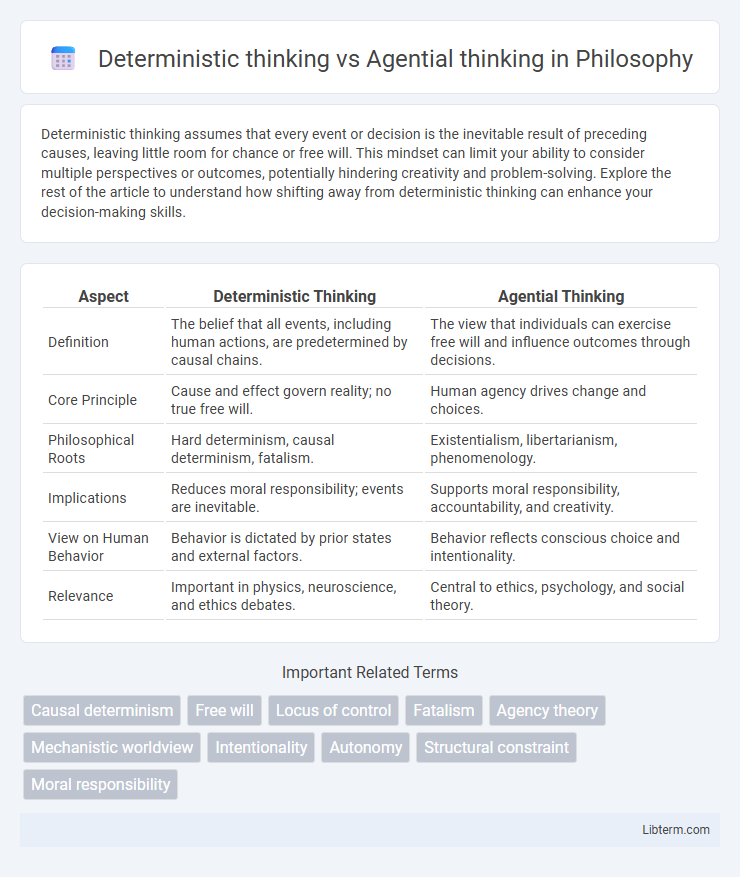Deterministic thinking assumes that every event or decision is the inevitable result of preceding causes, leaving little room for chance or free will. This mindset can limit your ability to consider multiple perspectives or outcomes, potentially hindering creativity and problem-solving. Explore the rest of the article to understand how shifting away from deterministic thinking can enhance your decision-making skills.
Table of Comparison
| Aspect | Deterministic Thinking | Agential Thinking |
|---|---|---|
| Definition | The belief that all events, including human actions, are predetermined by causal chains. | The view that individuals can exercise free will and influence outcomes through decisions. |
| Core Principle | Cause and effect govern reality; no true free will. | Human agency drives change and choices. |
| Philosophical Roots | Hard determinism, causal determinism, fatalism. | Existentialism, libertarianism, phenomenology. |
| Implications | Reduces moral responsibility; events are inevitable. | Supports moral responsibility, accountability, and creativity. |
| View on Human Behavior | Behavior is dictated by prior states and external factors. | Behavior reflects conscious choice and intentionality. |
| Relevance | Important in physics, neuroscience, and ethics debates. | Central to ethics, psychology, and social theory. |
Understanding Deterministic Thinking
Deterministic thinking interprets events as inevitable outcomes dictated by prior causes, emphasizing predictability and fixed sequences. This perspective assumes that every effect follows from preceding conditions according to strict natural laws, limiting the perception of free will or randomness. Understanding deterministic thinking is crucial for analyzing systems governed by cause and effect, such as physics, classical mechanics, and certain behavioral models.
Key Concepts of Agential Thinking
Agential thinking centers on the belief that individuals possess the capacity to influence outcomes through intentional actions, emphasizing personal autonomy and accountability. This cognitive approach highlights adaptive problem-solving, proactive decision-making, and the recognition of one's role in shaping future events. Unlike deterministic thinking, which views events as predestined and inevitable, agential thinking promotes empowerment by acknowledging the dynamic interaction between choice and circumstance.
The Philosophy Behind Determinism
Deterministic thinking is anchored in the philosophy of determinism, which asserts that every event and decision is the inevitable outcome of preceding causes, leaving no room for free will. In contrast, agential thinking emphasizes human autonomy and moral responsibility, suggesting that individuals can initiate actions independent of prior events. The philosophical debate centers on whether the universe operates like a causal chain or if conscious agents possess genuine freedom to shape their destinies.
How Agency Shapes Human Behavior
Agency shapes human behavior by enabling individuals to make intentional choices, which contrasts with deterministic thinking that views actions as predetermined by external factors or internal drives. This sense of agency empowers people to influence outcomes through deliberate decisions, fostering responsibility and adaptive problem-solving. Understanding human behavior requires recognizing the dynamic interplay between deterministic constraints and the capacity for agential self-direction.
Determinism vs Agentialism: Core Differences
Determinism asserts that every event or decision is the inevitable result of preceding causes, eliminating true free will by viewing actions as predetermined by prior conditions. Agentialism emphasizes individual autonomy and the capacity for conscious choice, arguing that humans actively shape outcomes through intentional decision-making despite external influences. The core difference lies in Determinism's fixed causal chains versus Agentialism's endorsement of human agency and meaningful intervention in the causal process.
Implications for Personal Responsibility
Deterministic thinking posits that all events, including human actions, are predetermined by prior causes, which can diminish the perceived scope of personal responsibility by framing behavior as inevitable. Agential thinking emphasizes individuals' capacity for choice and control, reinforcing accountability through the belief in free will and intentionality. Understanding the contrast between these perspectives informs ethical frameworks and legal systems by shaping how responsibility and blame are assigned.
Deterministic Thinking in Everyday Life
Deterministic thinking in everyday life involves perceiving events and behaviors as predetermined by prior causes, leading to a predictable and fixed outcome. This mindset influences decision-making by reducing perceived personal agency and increasing reliance on routine and external factors. Understanding deterministic patterns can help identify underlying causes of actions but may limit adaptability and creative problem-solving.
Benefits of Adopting an Agential Mindset
Adopting an agential mindset fosters greater personal empowerment by emphasizing individual choice and responsibility in shaping outcomes, enhancing problem-solving skills and adaptability. This approach encourages proactive decision-making and innovation, leading to increased resilience in facing challenges. Embracing agential thinking promotes a growth-oriented perspective that drives continuous self-improvement and meaningful action.
Overcoming the Limits of Determinism
Deterministic thinking confines outcomes to predetermined causes, restricting adaptability and innovation, whereas agential thinking empowers individuals to recognize their capacity for intentional action and change. Overcoming the limits of determinism involves embracing human agency, fostering proactive decision-making, and leveraging cognitive flexibility to shape future possibilities. This shift enables a dynamic interaction between choice and circumstance, promoting resilience and creative problem-solving beyond rigid causal boundaries.
Practical Strategies to Foster Agential Thinking
Practical strategies to foster agential thinking involve promoting a growth mindset, encouraging reflective decision-making, and creating environments that support autonomy and accountability. Implementing problem-solving exercises and scenario-based learning enhances individuals' ability to adapt and act intentionally rather than relying on deterministic assumptions. Cultivating self-awareness and emphasizing the role of personal agency in shaping outcomes empower individuals to take proactive control over their circumstances.
Deterministic thinking Infographic

 libterm.com
libterm.com